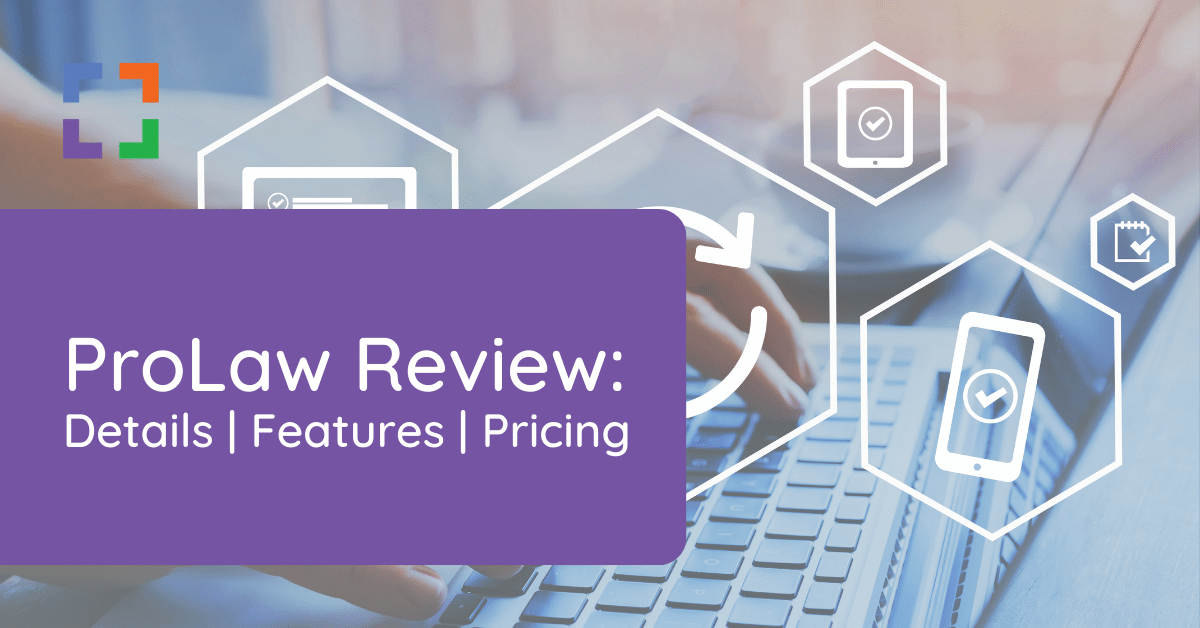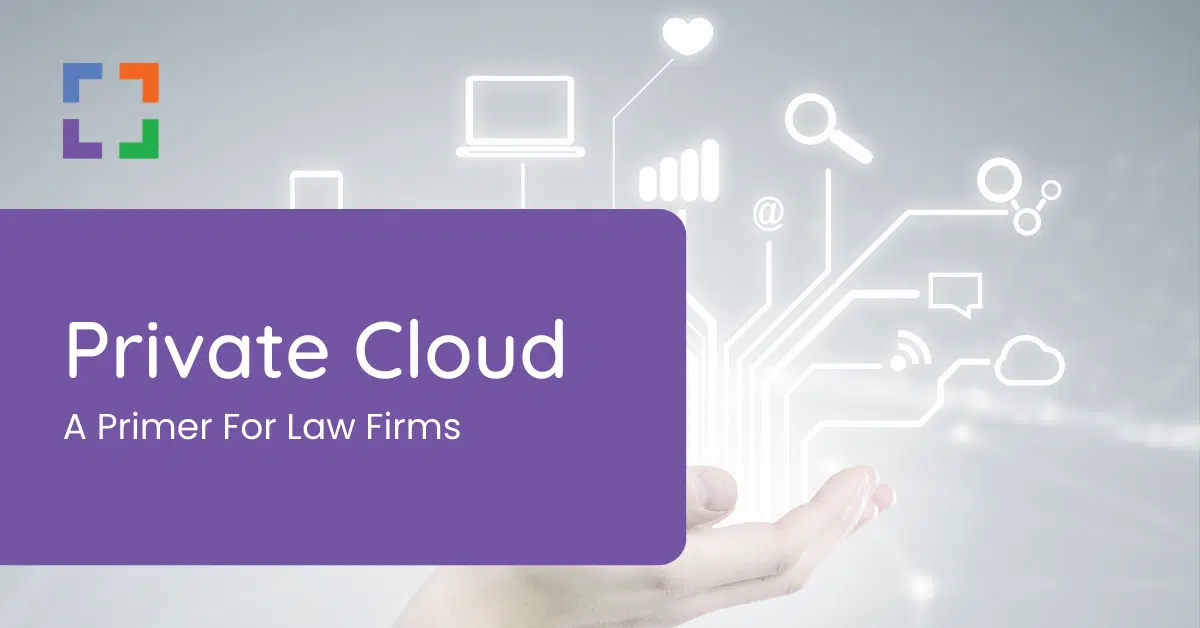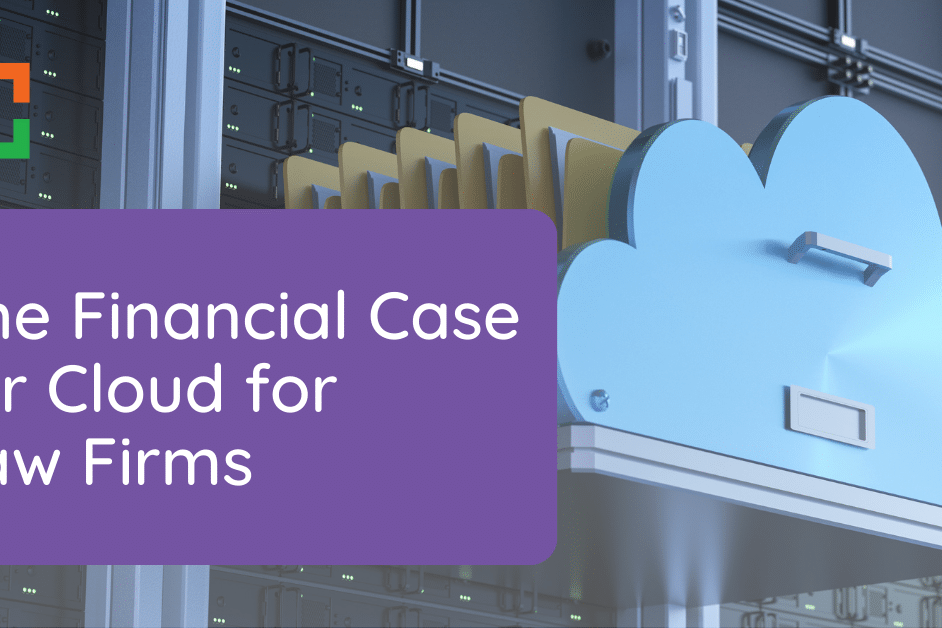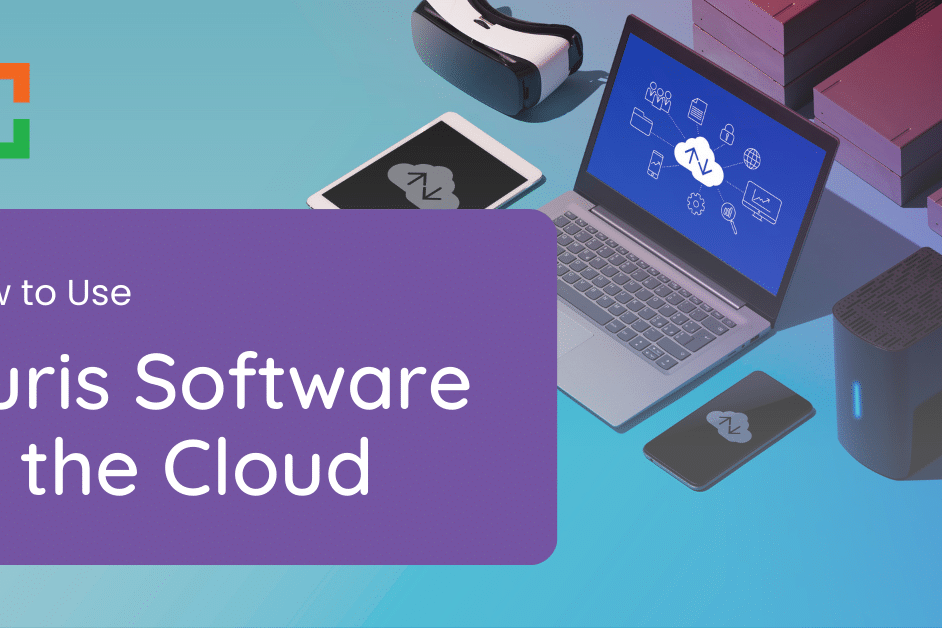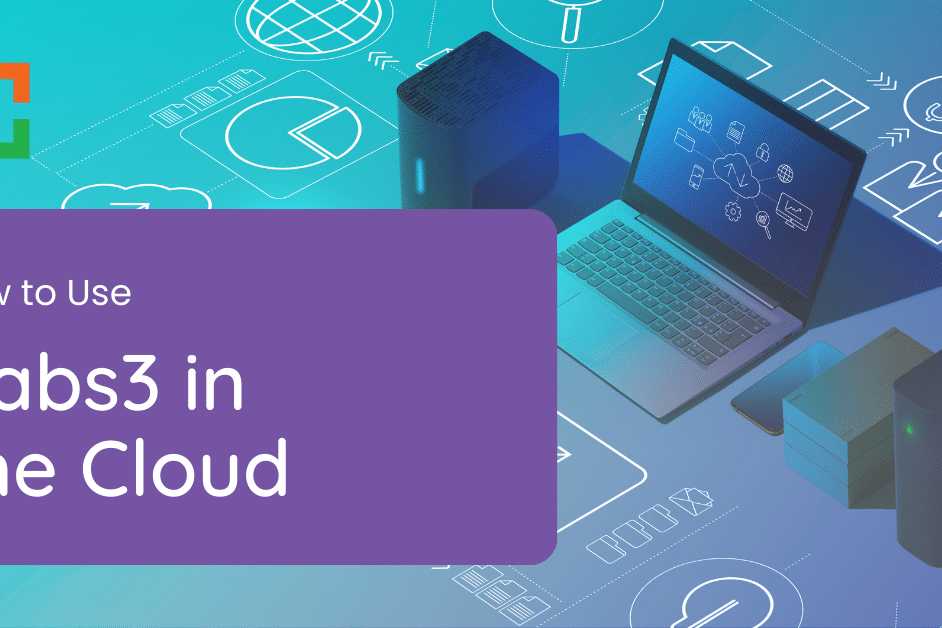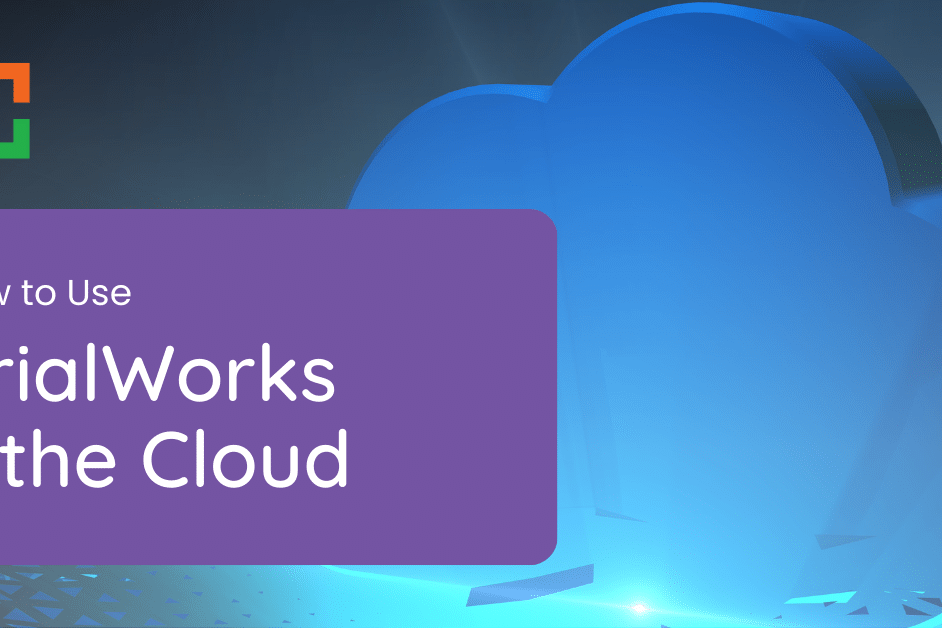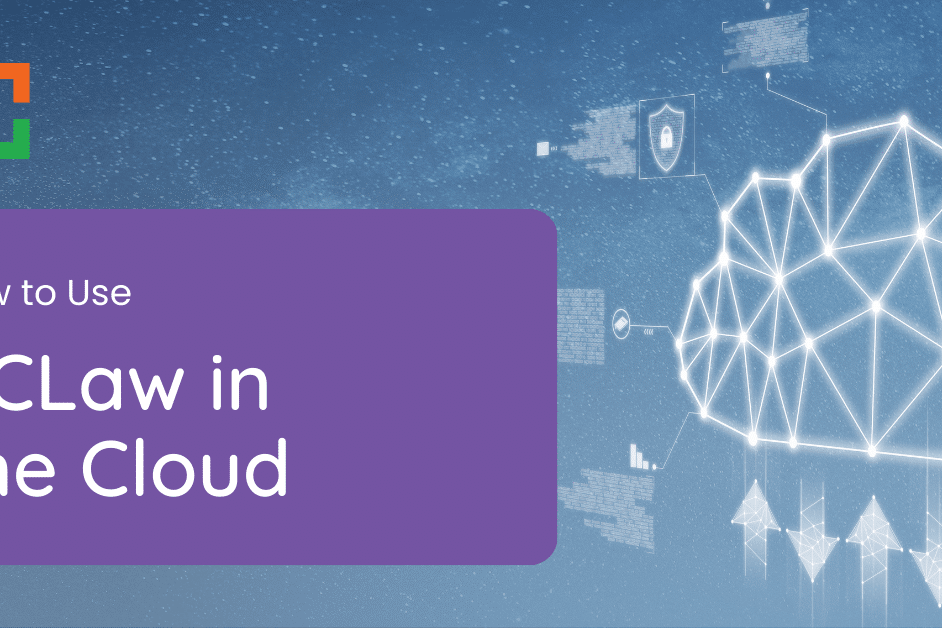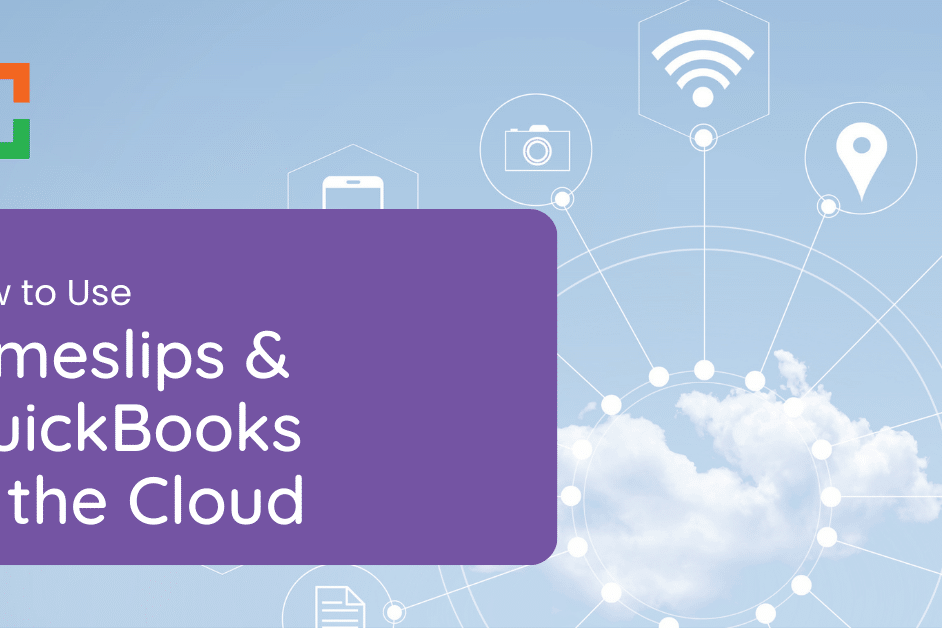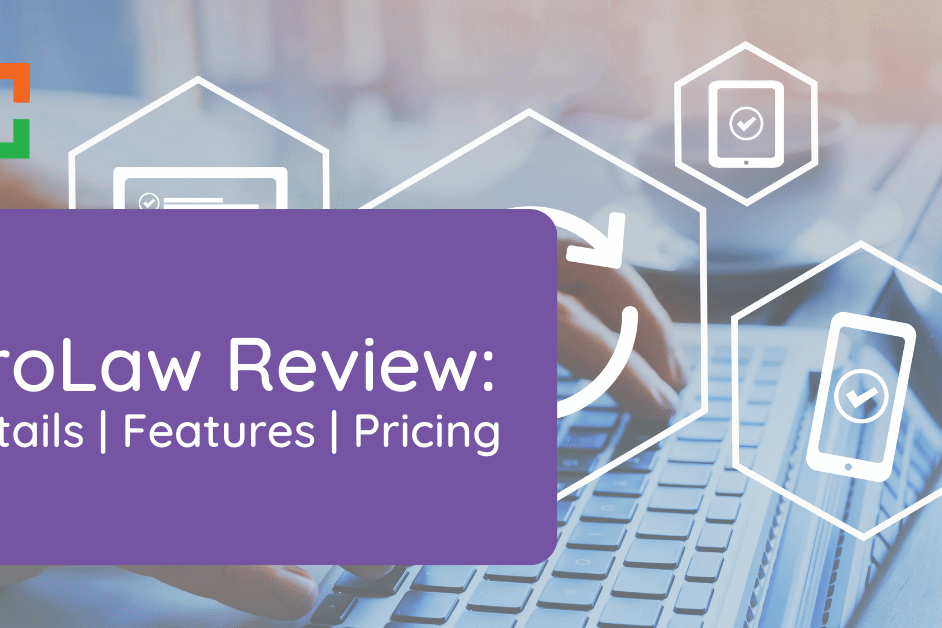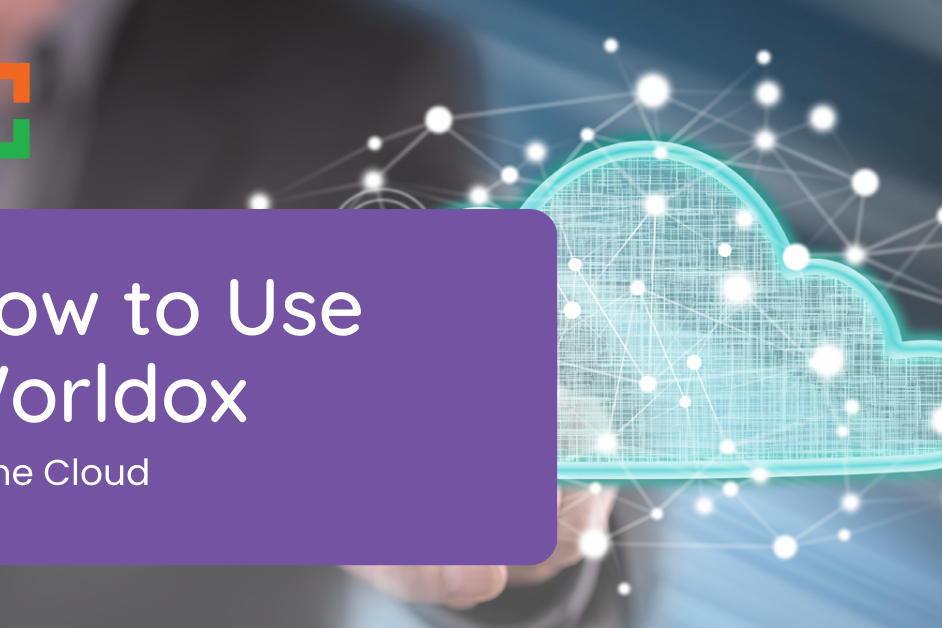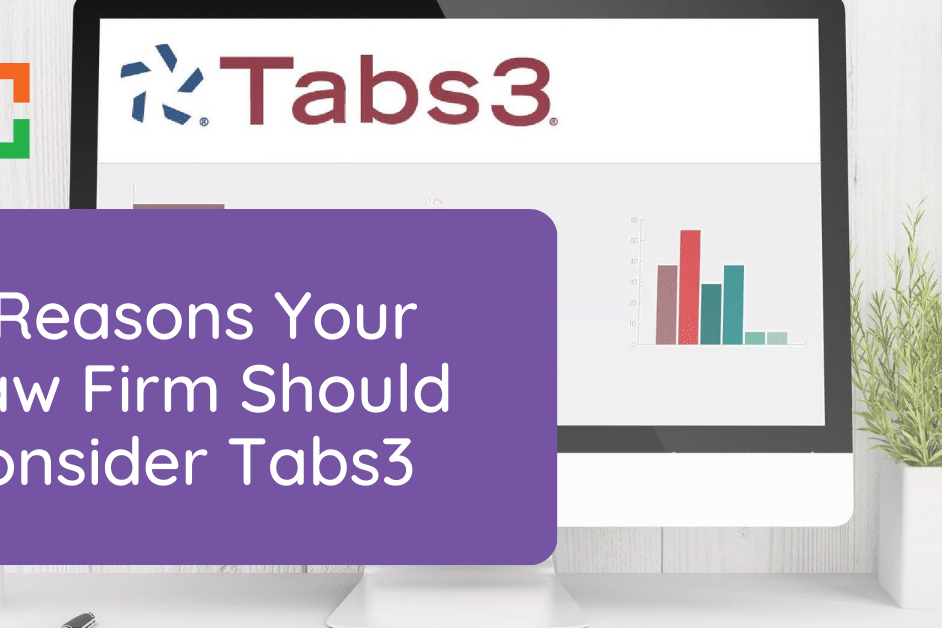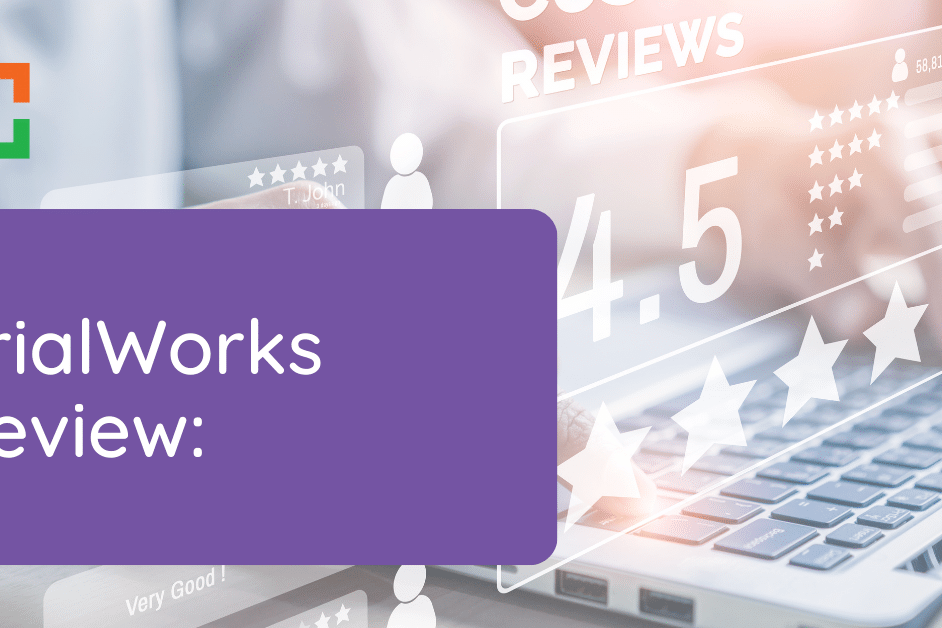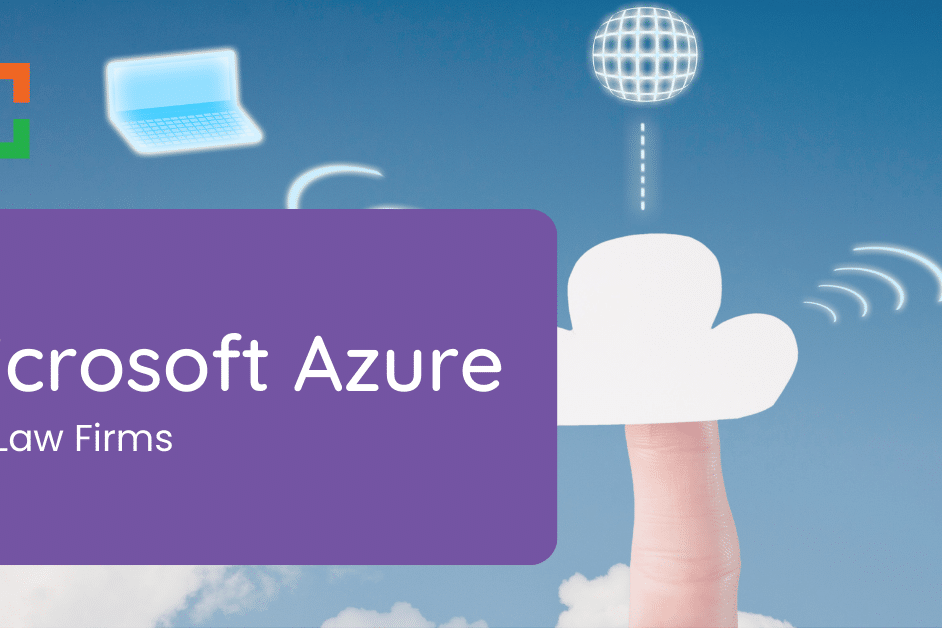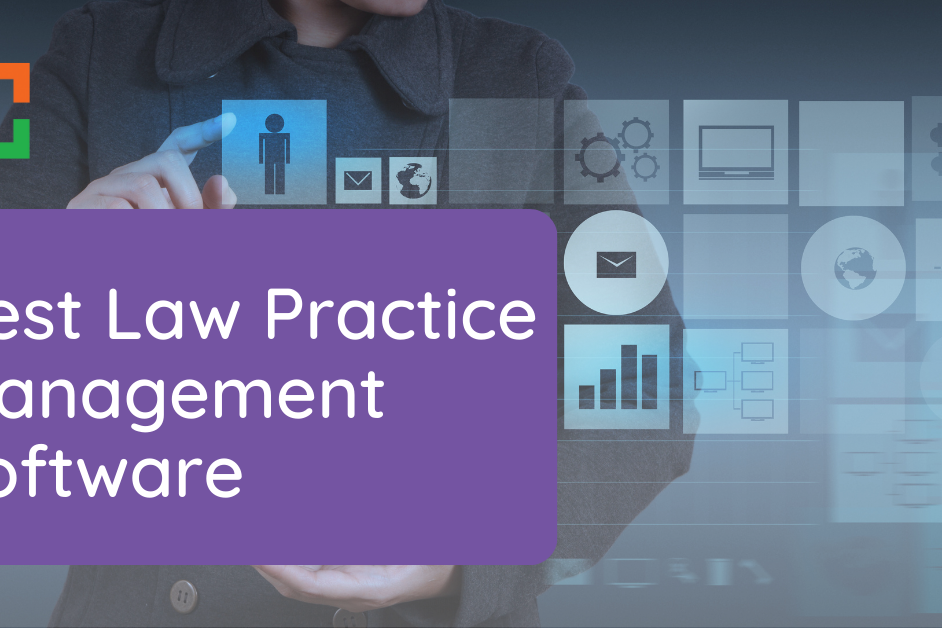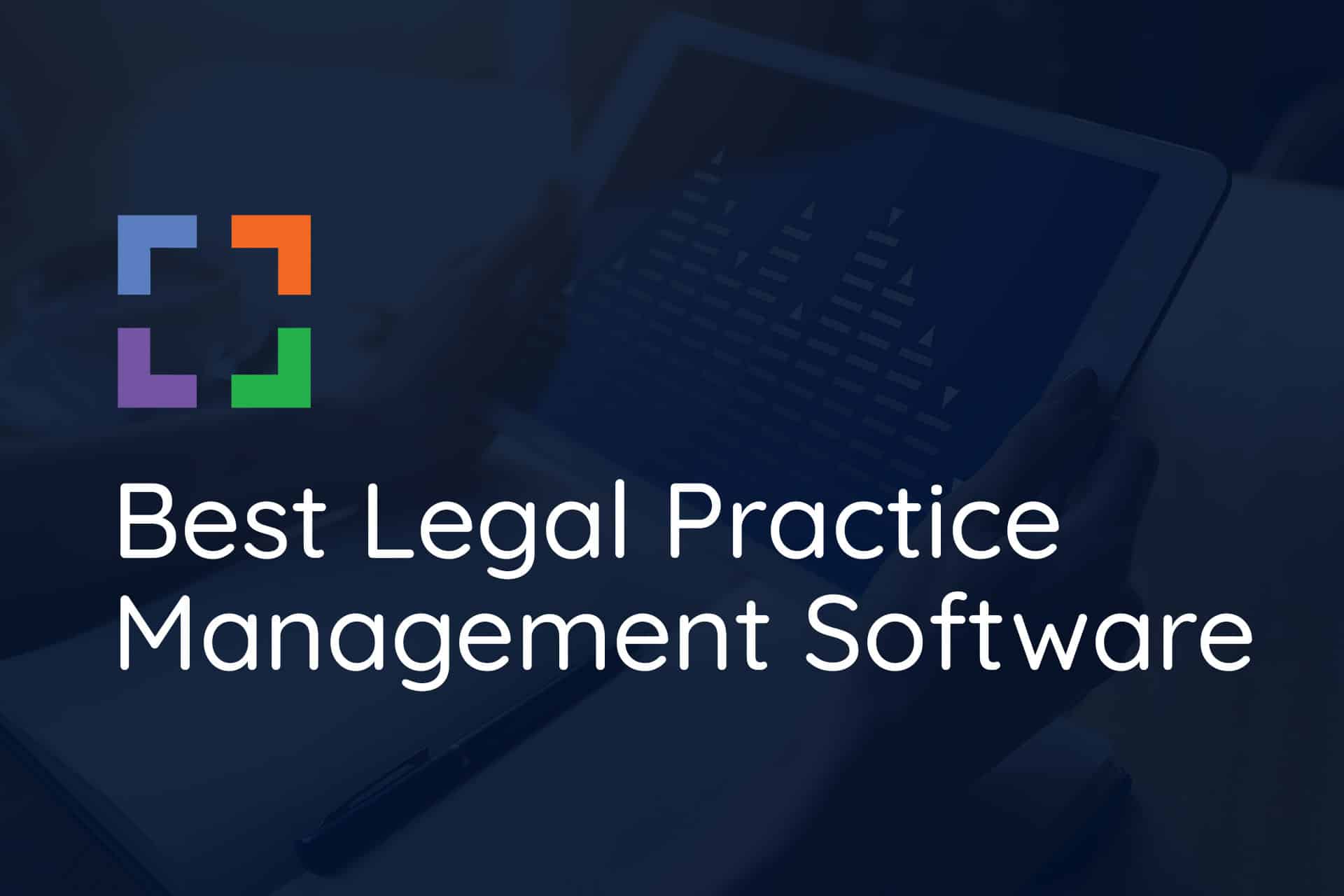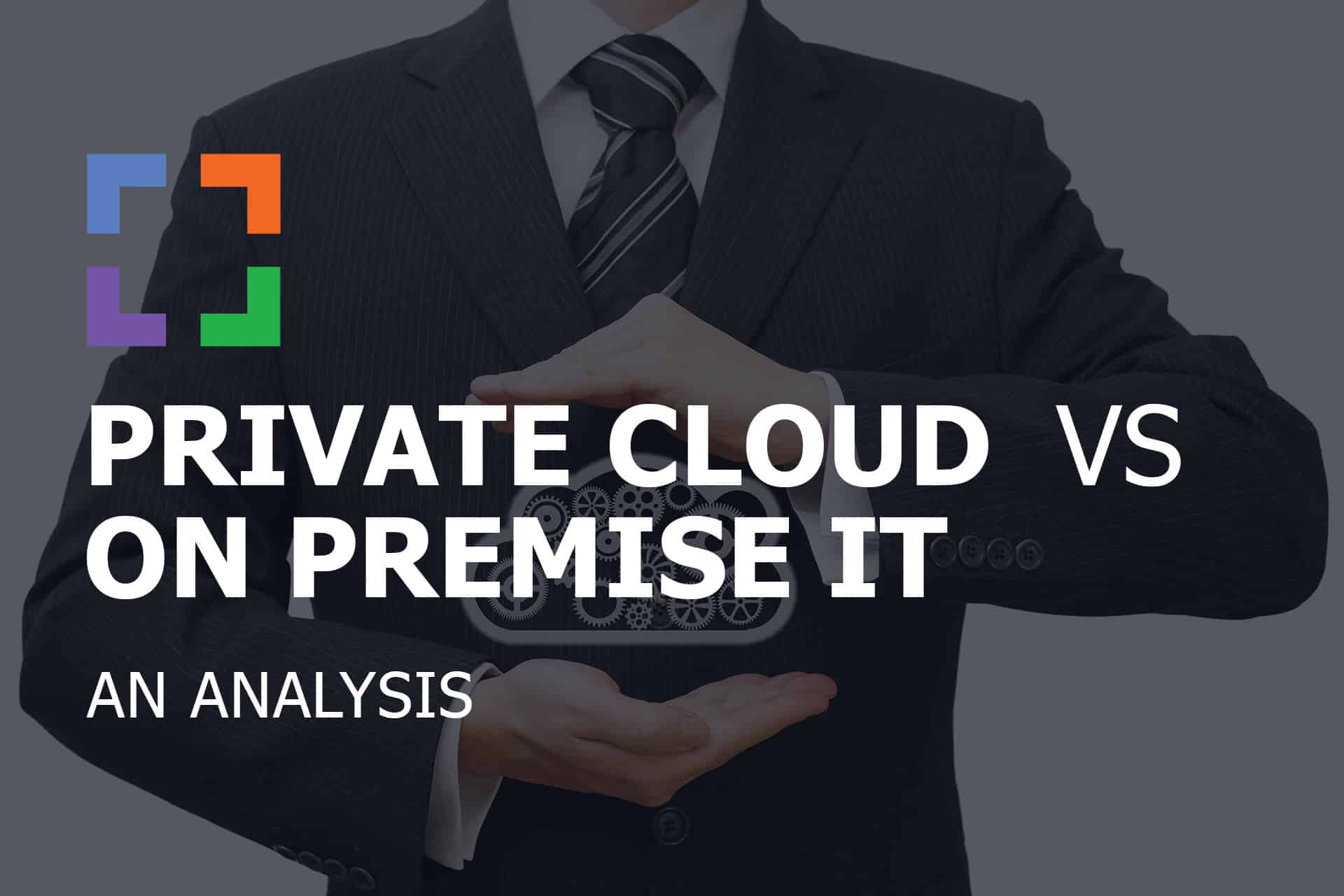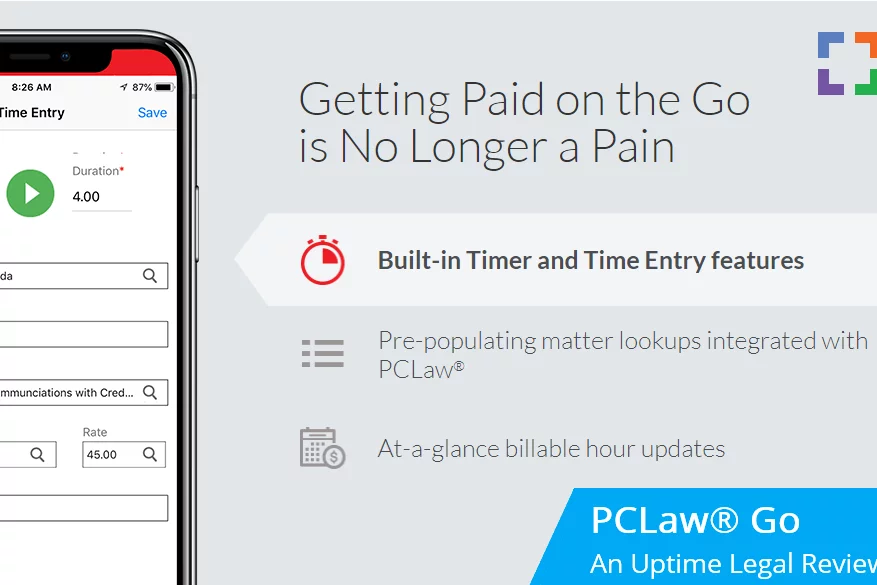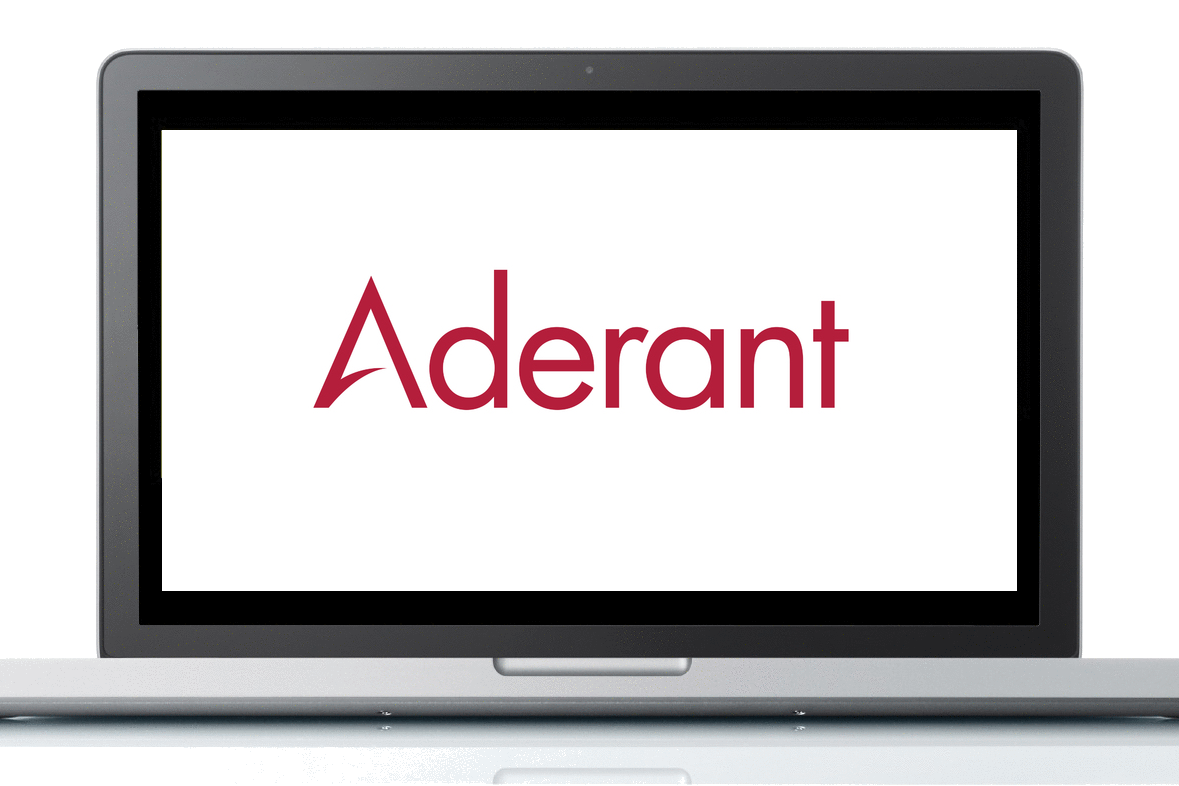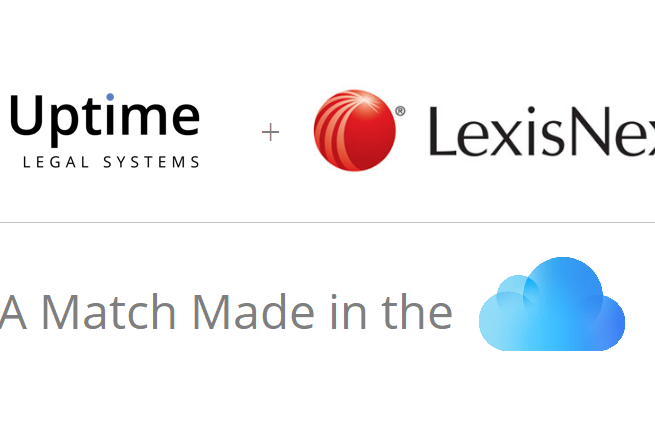ProLaw Support – How to Get Help for ProLaw

Let’s talk about ProLaw Support.
ProLaw, developed by Elite (a division of Thomson Reuters), serves as a comprehensive Law Practice Management (LPM) software solution.
ProLaw stands out as perhaps the only legal software that encompasses all three essential pillars for operating a law practice — Law Practice Management, Legal Document Management, and Law Firm Accounting.
However, navigating through the various support options, such as ProLaw itself, authorized consultants, and private cloud solutions, can be a challenge.
In this article, we will discuss the various options you have to choose from while providing strategies to ensure you receive the best support for ProLaw.
By the end, you’ll have the answers to:
- Why is reliable support for ProLaw essential?
- How can you identify the best approach for ProLaw support?
- Who should you reach out to when you need help?
- What do you need to understand about training or hosting challenges?
- Is a Private Cloud or Virtual Desktop the ideal choice?
- and more!
Whether you’re a seasoned ProLaw user or a firm newly exploring its features, this guide seeks to support you in unlocking the full potential of this comprehensive software, leading to heightened efficiency and productivity for your firm.
Introduction: The Best ProLaw Support
Simply put, ProLaw is powerful. Although it might be excessive for solo practitioners and very small firms (those with fewer than 10 members), it’s an excellent choice for midsize and larger firms seeking extensive functionality in their practice management platform.
ProLaw is modular.
Essentially, this means that they offer a suite of software modules, allowing firms to select and utilize the components they require (and potentially expand to other modules as needed). The three core pillars of the ProLaw software suite are Practice Management, Document Management, and Accounting — you’ll be piecing components together from these categories. They may not be the best solution in each category, but they do serve well for firms looking to get their main pieces of software from a singular company.
The implementation of ProLaw can therefore be customized to your needs. However, as with any software, you’ll undoubtedly run into issues along the way.
That’s where having substantial ProLaw Support comes in, and where the focus of this article will be.
In light of modern needs and desires, there has been a rush toward working remotely. These server-based software platforms have required you to only work in the office. Now, being able to work remotely has become a primary goal for many.
You could choose a web-based software, but you may find that they lack necessary functionality. So, what are the solutions? We’ll cover those shortly as well.
Regardless of whichever route you take, the most important thing to remember is that ensuring that you have set up support for ProLaw optimally, so you won’t have any headaches down the road.
Related – ProLaw Review: Learn about the features, utilization, and getting ProLaw for your law firm.
ProLaw Software Overview
ProLaw is can be utilized in 2 versions — on-premise and web-based, with both being hosted on a server.
Typically, when you opt for a web-based software, you are giving up some features and robustness in exchange for a more lightweight, flexible platform. This is no exception, but it may not be a problem.
Let’s discuss the differences between the two and what you can expect.
ProLaw On-Premise
ProLaw is long-standing software that offers robust features for those willing to utilize their traditional, on-premise software.
Of course, there are drawbacks to on-premise software such as having to concern yourself with server ownership and not being able to use the software from anywhere aside from the office (unless you have a private cloud or another workaround).
For the moment, let’s say that you don’t mind maintaining servers or have already decided to pursue a cloud-solution.
In which case, you’ll be able to look forward to the following standout features:
Comprehensive Yet Customizable Legal Software Suite
ProLaw offers a modular approach, allowing customers to opt for the front-office module (encompassing practice and document management), the back-office module (covering business and trust accounting), or both.
Seamless Integration with Microsoft Office
ProLaw has extensive integration capabilities with the Microsoft Office suite, notably with Word (for documentation) and Outlook (for emails). It also pairs well with Westlaw and WestlawNext.
Streamlined Web Interface Option
Introducing the ProLaw Workspace feature, ProLaw now presents an intuitive web-based interface for accessing its database. While advanced users can benefit from the rich functionality of the desktop application, this offers a more straightforward interface for users with simpler needs.

This server/desktop-based software offers a broad array of other features, including:
- Client & Contact Management
- Case/Matter Management
- Calendaring
- Time & Billing
- Task & Workflow Management
- Document Management
- Business/Trust Accounting
- Document Assembly/Automation
- Document Management
- Email Management
However, it’s important to keep in mind that ProLaw does not offer these features:
- Document Storage
- Open API
- Client Portal
ProLaw Workspace
In the past, ProLaw software was typically installed on each computer (be it desktop or laptop) within your firm, with its database housed on your firm’s internal servers or on a Private Cloud.
Yet, as legal practices evolve, many firms are drawn to the user-friendly nature of contemporary practice management tools that run directly in a web browser. Of course, many want this without having to compromise on functionality or making a complete switch in legal software.
Enter ProLaw Workspace: an optional extension of the ProLaw suite. This provides selected users within your firm with a streamlined, web-centric interface to access the ProLaw system. Crucially, ProLaw Workspace isn’t a totally different system but an alternative access point to the same core database that the desktop version of ProLaw taps into.
This dual approach essentially offers your firm flexibility and choice: a feature-rich desktop experience or a more straightforward, browser-based version.
So, while some members of your firm might prefer the comprehensive ProLaw desktop application, others might opt for the web-accessible ProLaw Workspace. Both options have their unique merits and both require servers to run.
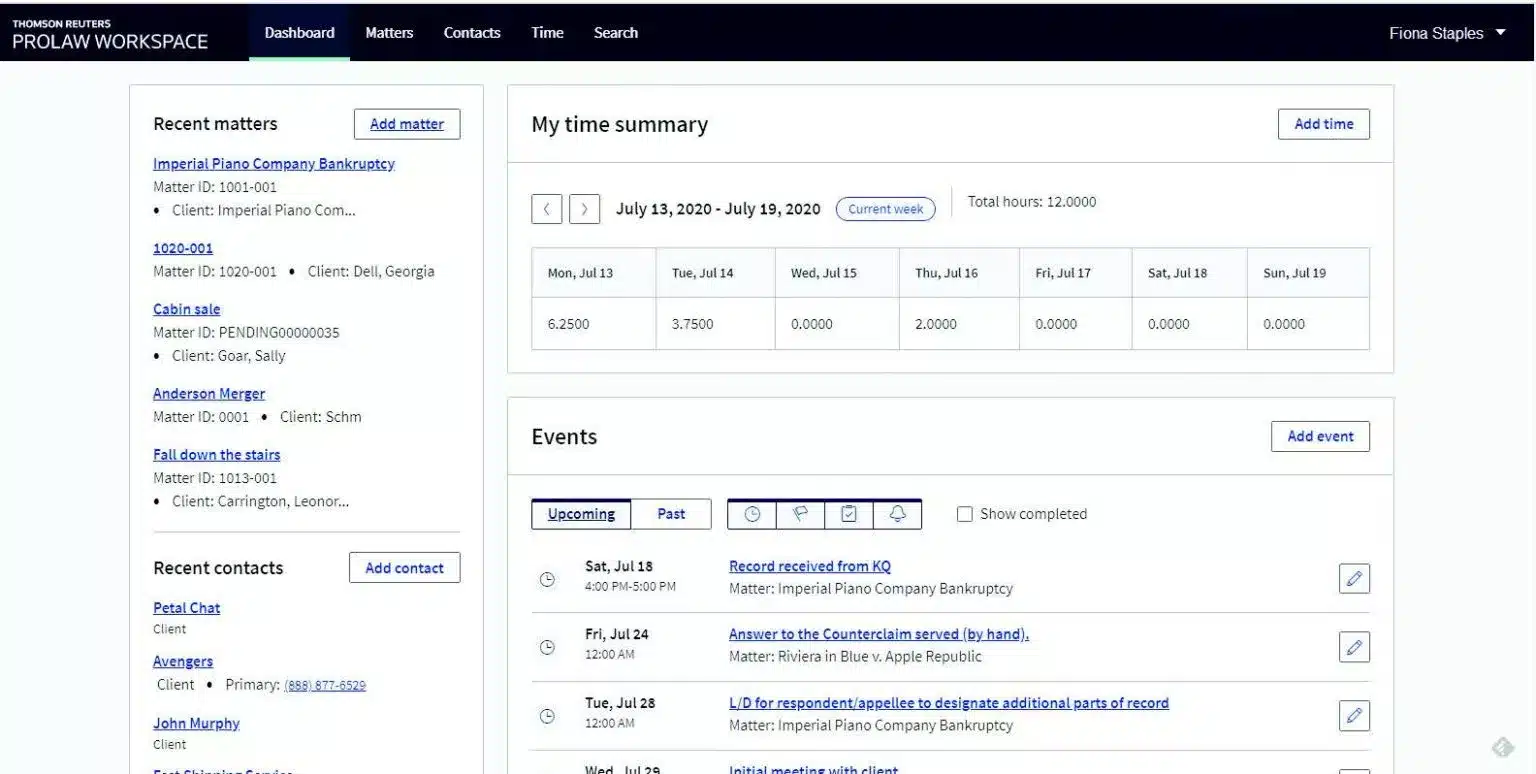
What's the Best Option
The Desktop Interface is ideal for “power users” in your firm – those who require the comprehensive capabilities of case management, document management, and intricate accounting features.
On the other hand, the Web-Based Interface caters to more casual users within your firm. These users benefit from essential ProLaw features without the need for the exhaustive functionalities present in the robust desktop version.
When you’re deciding who will use what, it’s helpful to keep in mind that some members of your firm may prefer this slimmed down add-on as opposed to the traditional, feature-rich version.
Related – ProLaw Workspace: Gain a deeper understanding of ProLaw’s Workspace offering.
Setting Up ProLaw
ProLaw must be purchased from ProLaw itself.
From there, ProLaw also requires that they do the initial setup (or at least particular parts of it). Since ProLaw is a robust platform, you’ll find that the server requirements may be more extensive than what you initially thought.
This is why it’s important that your IT company or Private Cloud Provider has a good working relationship with ProLaw. For example, Uptime Practice works with ProLaw engineers on a weekly basis, as we migrate law firms to the cloud regularly.
Keep in mind that both ProLaw traditional and ProLaw Workspace still require servers in some fashion.
Your real decision is whether you want to have servers of your own or if you’ll want to absolve your firm of server responsibility by choosing a reliable cloud provider. We’ll dig more into that later.

Getting ProLaw Support
For ProLaw users, there are three specific pathways to access support. Depending on your firm’s utilization of ProLaw and the support level needed, you can opt for one or a mix of these pathways.
ProLaw
When you acquire ProLaw and maintain your Annual Maintenance Plan (AMP), you are eligible for product support directly from ProLaw. This support encompasses help desk assistance as well as access to the ProLaw online knowledge base and training resources.
This ProLaw support option is particularly suitable for firms that need support sporadically, typically for “how do I” inquiries or rapid solutions. Given that it’s included in the cost of your AMP, I always advise firms to leverage this avenue, and supplement with other methods if needed.
Related – Managed IT Services for Law Firms: Effective IT services can transform the operations of a law firm. Learn how.
Certified Independent Consultants (CICs)
There exists a plethora of third-party consultants and professional service teams, but only a few are certified to provide support for ProLaw. These are experts in legal software and technology who have undergone the necessary training and acquired certification to support, deploy, and in certain instances, tailor ProLaw to specific needs.
Often, these Certified Implementation Consultants (CICs) operate as consulting agencies, though some function as independent consultants. They tend to specialize in deeper, hands-on ProLaw support, notably in integrating ProLaw into your firm’s procedures and workflows, training your personnel, and modifying ProLaw to align with your firm’s operations.
Even though ProLaw offers day-to-day support as part of the AMP, many legal practices choose to engage their CIC exclusively for ProLaw support, even when they’re eligible for direct support from ProLaw.
It’s worth noting that CICs, understandably, have fees for their services, so it’s essential to allocate a budget for this.
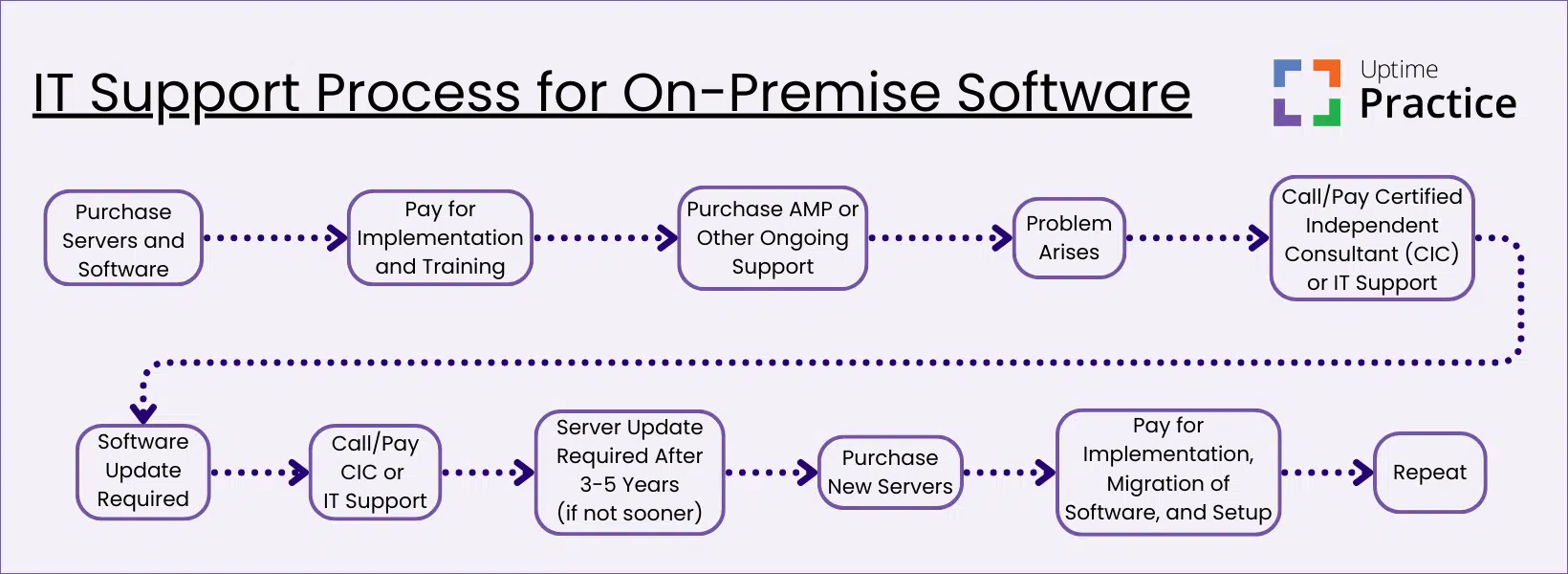
Private Cloud
Lastly, there’s the private cloud.
The private cloud has emerged as a modern alternative to maintaining and overseeing onsite servers and IT infrastructure. It hosts your ProLaw, other legal software, documents, and email on a unified platform, allowing your firm to access them from anywhere without the hassles associated with managing IT onsite.
A private cloud tailored for legal needs will be specially designed to host ProLaw, with all necessary ProLaw support, updates, and maintenance incorporated into the service.
Opting for a legal-centric Private Cloud may be the right choice if your firm seeks mobility, enhanced security offered by cloud technology, desires to steer clear of managing servers and IT in-house, and wishes to consolidate IT, hosting, and ProLaw support into one comprehensive package delivered by a singular provider.
The ideal private cloud platform will comprise:
- ProLaw hosting, support, and maintenance/updates
- Hosting for your additional legal and business software
- Integrated Microsoft Office for every user
- Exchange email for each user
- Unlimited IT and software support
- Local antivirus and network assistance
- Storage for your ProLaw database, documents, and other relevant data.
Choosing a legal-centric private cloud solution can be a wise decision for many law firms.
However, a word of caution if you’re leaning towards this option: Make sure your chosen private cloud provider is authorized to host ProLaw and has the requisite expertise in hosting, supporting, and upkeeping the software.
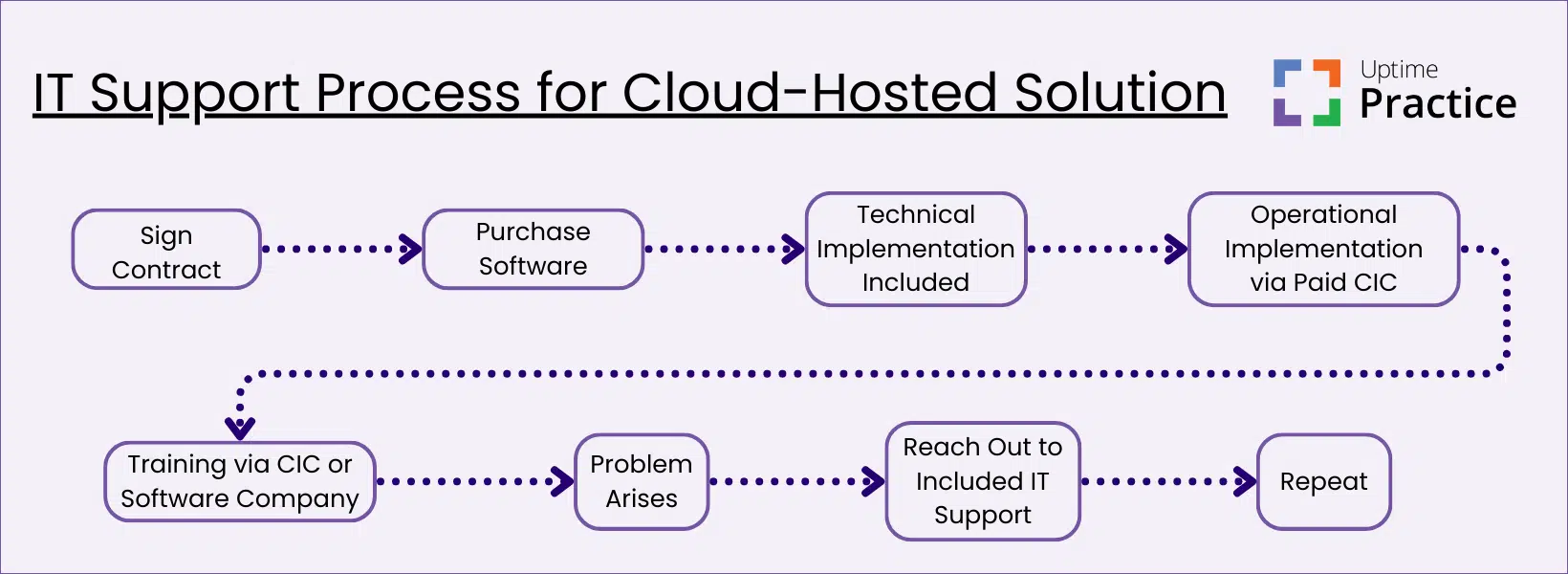
Move Your Legal Software to the Cloud
With Uptime Practice
- Cloudify Your Legal Software
- Expert Legal Software Hosting/Support
- Cloud Storage for Documents + Data
- End-to-End Security
- Office 365 + IT Support (Optional)
ProLaw in the Cloud
ProLaw, a comprehensive practice and document management software, has established itself as an indispensable asset for law firms across North America.
As the contemporary business environment increasingly embraces remote work, numerous law firms are seeking ways to reduce the expenses and complexity of managing in-house servers. Their goal is to equip their professionals with the capability to operate smoothly from any location, breaking down geographical barriers and fostering a more harmonious work-life equilibrium.
This shift has amplified the allure of cloud technology’s potential.
In today’s digitally-driven age, cloud technology can fundamentally redefine the way law firms function, presenting advantages like cost-effectiveness, adaptability, and enhanced efficiency. When it comes to ProLaw, migrating to the cloud can morph the software from being reliant on servers to a tool that’s more versatile, user-friendly, and efficient.
Let’s delve into how law firms can seamlessly transition their ProLaw practice management software to the cloud.
Related: As an Authorized Hosting Provider for ProLaw, consider:
Practice Go
Practice Foundation
CLOUDIFY PROLAW
Just ProLaw in the Cloud: Turn ProLaw into a cloud-based application. Eliminate servers, and access ProLaw from anywhere.
FULL PRIVATE CLOUD
All of your software, documents and data in secure Private Cloud. Work in a flexible virtual desktop environment; optionally add Office 365 + support
Cost of On-Premise vs. Cloud-Hosted Software
The financial comparison between hosting your software in-house and opting for a cloud hosting service should not be underestimated.
From the comparative table below, it’s evident that on-premise software typically emerges as the costlier and less predictable choice.
By selecting cloud-hosting, your law firm can shed the burdens of server and software upkeep, along with IT support tasks. This is because cloud-hosting services manage your software on their platforms and routinely carry out updates for you. Given that their core business is centered on these services, they often achieve cost reductions, which subsequently benefit their clients.
For a thorough and insightful evaluation, we recommend utilizing our Cloud Cost Calculator. This tool can assist in identifying the most strategic and cost-efficient approach for your law firm.
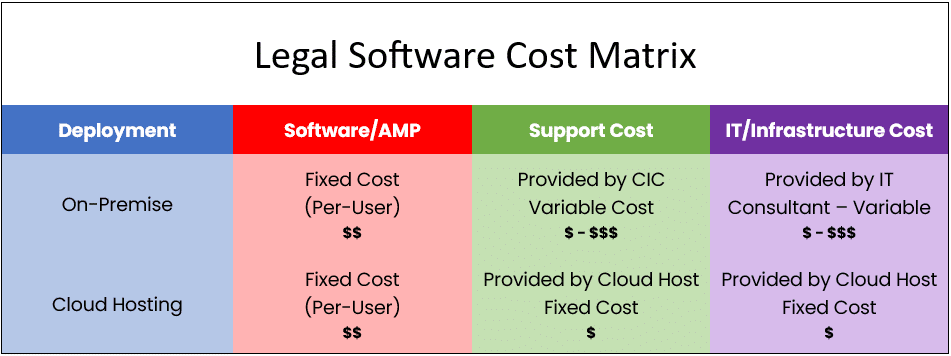
Related: The Financial Case for the Cloud
ProLaw as a Cloud App
ProLaw is originally an on-premise software, designed to function on a server. Historically, law firms have hosted such software on their in-house servers. In comparison, cloud-based software is operated over the internet and accessed via a web browser, negating the necessity for on-site servers.
Nonetheless, there are multiple ways to run ProLaw in the Cloud.
For instance, platforms like Practice Go can “cloudify” ProLaw. These mechanisms effectively enable you to utilize ProLaw as a web application in the Cloud, bypassing the need for individual servers.
Sounds enticing, doesn’t it? However, there’s a caveat…
This approach is most effective when a law firm intends to move only ProLaw or a single software to the cloud. For any additional software applications, distinct strategies would be necessary for each.
Should you be seeking a more all-encompassing solution, it might be worthwhile to explore options like a Private Cloud or Virtual Desktop for your firm.
For a deeper understanding of these alternatives, continue reading.
Related – ProLaw as a Cloud App: A Secure Cloud Platform for ProLaw. Eliminate Servers. Work Anywhere.
ProLaw in a Private Cloud
Having discussed the merits of ProLaw in a cloud environment, let’s now examine how it functions within this framework.
But first, a clarification is necessary between cloud-based (or web-based) software and desktop/server-based software.
Before the cloud computing boom, the majority of software, such as practice management tools like ProLaw, were installed on a firm’s in-house servers and accessed through the desktop computers of the firm’s personnel. The heart of the software, encompassing its database and core functions, resided on this server. Hence, for law firms, owning a server was indispensable for operating on-premise software like ProLaw.
This meant that the ownership and upkeep of servers and in-house IT infrastructure became an inherent part of using legal management software.
That was the status quo.
Yet, the technological landscape has evolved. Now, we are acquainted with a concept called the Private Cloud. A Private Cloud serves as a remotely hosted and managed IT platform, essentially replacing or even improving upon traditional servers. It houses a law firm’s applications, documents, emails, and other essentials, offering increased accessibility, dependability, and security.
Software like ProLaw, inherently server-based, invariably requires a server. However, when incorporated within a private cloud, the cloud essentially becomes the server.
To elucidate further, a standard law firm private cloud for ProLaw typically comprises of:
- Hosting for ProLaw and your other legal software
- Cloud storage – a filesystem for your files and folders
- Support for ProLaw – including updates and maintenance
- Office 365 – for productivity
- Microsoft SQL Server — Database Engine for ProLaw
- Exchange Email
- All necessary server maintenance, backups, and security
- IT Help Desk support for your team
Related – Private Cloud – A Primer for Law Firms: Read this article to have a better understanding of what a private cloud is and how it can benefit your law firm.
The “Private” in Private Cloud
The “Private” in Private Cloud
Private Clouds are so-called because every law firm (called a “tenant,” in cloud computing parlance), has their own segregated, dedicated working environment.
In most cases, that means:
- Dedicated/Private Virtual Servers
- Dedicated/Private Virtual Network (VLAN)
- Dedicated/Private Active Directory
- Dedicated/Private SQL Server/SQL Database
For those new to these technologies, the core takeaway is that your law firm possesses its own dedicated, secure realm for its software, documents, and data, separate from other law firms. This ensures an added dimension of data protection and confidentiality for your practice.
Related – How to Use ProLaw in the Cloud: Using ProLaw is great, and it’s even better in the cloud. Learn more.
That’s the “back-end” of running ProLaw in the cloud. You and your team will interact with the Private Cloud via what’s known as a Virtual Desktop.
ProLaw in a Virtual Desktop
We’ve delved into the advantages of running ProLaw on a cloud platform and the role of a Private Cloud in this. But what does it practically imply to function within a Private Cloud? How do members of your firm interact with it?
This is best explained with the idea of a Virtual Desktop.
At its core, a Virtual Desktop is like the familiar computer interface you’d find on Windows or Apple systems, but it’s hosted in the cloud and is accessible around the clock, from any location. Typically, this Virtual Desktop comes equipped with commonly used software, including Microsoft Word, Excel, Outlook, as well as your legal practice management tools, accounting software, and document management systems.
The beauty of a Virtual Desktop lies in its ability to provide access to your law firm’s software — which traditionally might only be available on office-based computers or when connected to office servers — from any device, anywhere globally.
Such Virtual Desktop offerings are often labeled as “Desktop-as-a-Service” or DaaS, drawing a parallel to the concept of “Software-as-a-Service” or SaaS.
How Virtual Desktops Work
In a Virtual Desktop setting, the software applications are housed on remote servers in a data center. Your local computer essentially becomes a portal or a gateway to access these applications. When you launch a program, it runs on these remote servers, not on your local machine. This setup allows you to access your software, documents, and other data from anywhere with an internet connection, using various devices.
Thus, rather than being confined to a single physical location, your digital workspace becomes universally accessible. The heavy lifting, in terms of processing and data storage, is offloaded to these robust servers, while your local device merely serves as an interface to interact with your virtualized environment.
More often than not, the only feature you’ll find on your local desktop is a shortcut — acting as a portal to your Virtual Desktop.
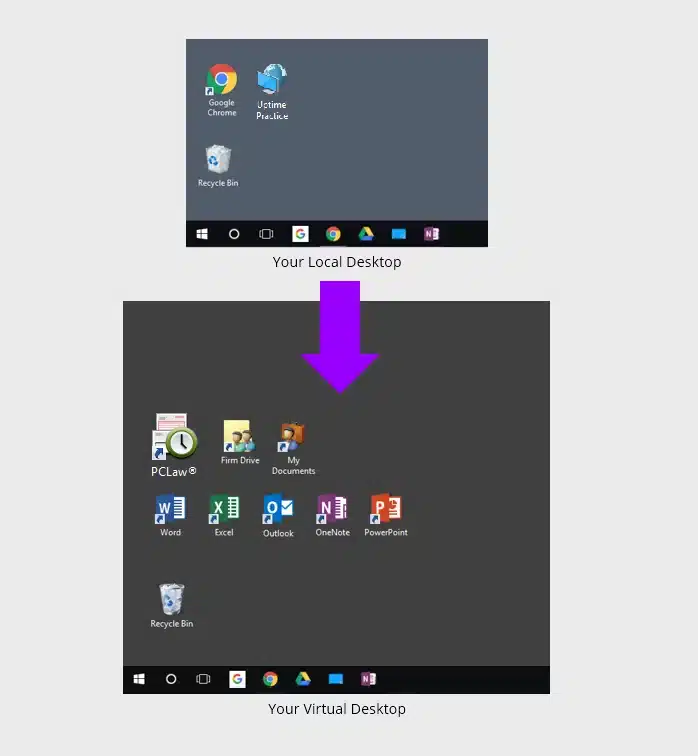
Upon logging into your Virtual Desktop, you or any member of your team can access all of your law firm’s software, documents, and data.
This includes:
- Your ProLaw Software
- Your Other Legal Software
- Your Productivity Software (Microsoft Office)
- Your Documents, Files and Folders
- Your Outlook & Email
With this arrangement, every member of your firm can access ProLaw, as well as all other applications, documents, and data, regardless of their location or the device they’re using.
Moreover, Virtual Desktops negate the hassle of individually installing, updating, and overseeing each software on every firm’s computer. Instead, the upkeep and modernization of all your software becomes the duty of your Cloud Service Provider, streamlining processes and eliminating potential headaches.
Such a strategy not only brings heightened ease of use but also centralizes the management of your software tools, lifting the burden off your shoulders.
Related – Virtual Desktops for Law Firms: How nice would it be to access all of your apps from anywhere, anytime? Learn more.
Should My Law Firm Use Virtual Desktops?
Virtual Desktops bring many advantages to law firms. Specifically, Virtual Desktops are likely the best technology route in any of the following scenarios.
- Your firm is committed to the ProLaw software
- Your firm uses a combination of devices (Windows, Macs, Tablets)
- Your firm needs to be able to work from anywhere
- You're tired of dealing with servers and IT headaches
- Your firm needs to keep your applications an data secure
Virtual Desktops Demonstrated
For an example of working in a Virtual Desktop, watch our demonstration of Uptime Practice.
Closing the Loop
Again, I’m not implying that one of these options stands out as superior to the others. In reality, your ProLaw support strategy might encompass a blend of two or even all three of these methods. It genuinely boils down to the unique requirements of your law firm.
I urge you to investigate all the avenues available. Engage in conversations with multiple Certified Independent Consultants. Discuss with various Private Cloud providers. Dive deeper into online research, or converse with peers who also utilize ProLaw.
Wishing you success in whatever support strategy you devise for ProLaw.
Frequently Asked Questions - ProLaw Support
- Client & Contact Management
- Case/Matter Management
- Calendaring
- Time & Billing
- Task & Workflow Management
- Document Management
- Business/Trust Accounting
- Document Assembly/Automation
- Document Management
- Email Management
- ProLaw When you purchase ProLaw and sustain your Annual Maintenance Plan (AMP), you gain direct product support. This support encompasses access to a dedicated help desk, as well as the ProLaw online knowledge base and training resources.
- Certified Independent Consultants (CICs) These professionals specialize in legal software and technology. They have undergone the requisite training and achieved certification, enabling them to support, implement, and, in some cases, perform accounting tasks related to ProLaw.
- Private Cloud Lastly, the private cloud stands as an option. This method often serves as a preferable choice over the traditional route of owning and overseeing on-site servers and IT systems. A private cloud will accommodate your ProLaw software, additional legal tools, documents, and emails on a unified platform. Your firm can access this anywhere, alleviating the complications inherent in managing in-house IT.
- ProLaw as a Cloud App – This your sole app that is accessible everywhere and is hosted on the cloud by your chosen provider.
- ProLaw in a Private Cloud – Your very own private cloud with all of your legal apps hosted for you.
- ProLaw as part of a Virtual Desktop – ALL of your apps are hosted for you, so you just have to login to your virtual desktop from anywhere, anytime.
- Hosting for ProLaw and your other legal software
- Cloud storage – a file-system for your files and folders
- Support for ProLaw and your legal software – including updates and maintenance
- Office 365 – for productivity
- Microsoft SQL Server — Required by Some Versions of ProLaw
- Exchange Email
- All necessary server maintenance, backups and security
- IT Help Desk support for your team
The Virtual Desktop allows for global access to your law firm’s software, which is usually only available from your work computer or when linked to your office’s servers.
Sometimes, Virtual Desktop solutions are referred to as “Desktop-as-a-Service,” or DaaS, which is analogous to the concept of “Software-as-a-Service,” or SaaS.
Uptime Legal is an Authorized Hosting Provider and hosts ProLaw for hundreds of law firms across North America.
Our private cloud solution, Uptime Practice, will host your legal software, documents, data and email. It includes unlimited IT support–for your cloud, your software and your entire firm.
Uptime Practice:
The IT & Cloud Platform for Law Firms.
Uptime Practice is a suite of Managed IT and cloud services, made exclusively for law firms.
Practice Next
Technology + Legal Software Support for Modern Law Firms
Practice Next is a suite of Managed IT, Legal Software Support, and Cloud Essentials, made just for law firms.
-
Practice Next is a suite managed IT, technology essentials and legal software support.
-
Practice Next includes unlimited IT and legal software support, Microsoft 365, legal-centric cloud storage and more.
-
Practice Next pairs great with cloud-based legal software such as Clio Manage, CosmoLex, MyCase and more.
Practice Go
Cloudify Your Legal App
Does your law firm already have a cloud strategy, but have one premise-based application still running on onsite servers? Practice Go is for you.
- With Practice Go, we effectively turn your desktop/server- based legal software into a cloud application (a Published App), freeing your firm from the limitations of traditional software.
- Practice Go can cloudify your PCLaw, Time Matters, Tabs3, ProLaw, Juris, QuickBooks and more.
Practice Foundation
Complete Private Cloud for Law Firms
If your law firm needs a central, secure cloud platform for all of your legal software, documents and data, Practice Foundation is for you.
-
Practice Foundation is an end-to-end cloud platform that will host all of your firm's applications and documents, and will optionally include Office 365 + unlimited IT support. Everyone in your firm logs into a Virtual Desktop where they'll find all of their apps and docs.
-
Practice Foundation works with PCLaw, Time Matters, Tabs3, ProLaw, Juris, QuickBooks, Timeslips, TrialWorks, Adobe Acrobat and more.
Not Sure Which Edition You Need?
No problem. Check out our quick Comparison Chart for Uptime Practice, or Get in Touch to talk with our sales team.

Dennis Dimka
As the founder and CEO of Uptime Legal Systems, I've had the privilege of guiding our company to become a leading provider of technology services for law firms.
Our growth, both organic and through strategic acquisitions, has enabled us to offer a diverse range of services, tailored to the evolving needs of the legal industry.
Being recognized as an Ernst & Young Entrepreneur of the Year Finalist and seeing Uptime Legal ranked among the Inc. 5000 list of fastest-growing private companies in America for eight consecutive years are testaments to our team's dedication.
At Uptime Legal, we strive to continuously innovate and adapt in the rapidly evolving legal tech landscape, ensuring that law firms have access to the most advanced and reliable technology solutions.
Related Posts
April 1, 2024
The Financial Case for Cloud for Law Firms
March 8, 2024
25 Things To Ask Your Legal Private Cloud Provider
March 5, 2024
How to Use ProLaw in the Cloud in 2025
January 8, 2024
How to Use Orion Legal Software in the Cloud in 2025
January 8, 2024
How to Use Time Matters in the Cloud in 2025
January 8, 2024
How to Use Juris in the Cloud in 2025
January 8, 2024
How to Use Tabs3 in the Cloud in 2025
January 8, 2024
How to Use TrialWorks in the Cloud
January 8, 2024
How to Use PCLaw in the Cloud in 2025
January 8, 2024
How to Use Timeslips & QuickBooks in the Cloud in 2025
December 15, 2023
ProLaw: Complete Review, Features, Pricing
December 15, 2023
How to Use Worldox in the Cloud in 2023
December 15, 2023
7 Reasons Your Law Firm Should Consider Tabs3
December 15, 2023
ProLaw Workspace – Review & Guide for Law Firms
December 15, 2023
TrialWorks – An Uptime Legal Review
December 15, 2023
Cybersecurity for Law Firms
December 8, 2023
Managed Cloud Services for Law firms
October 24, 2023
AWS for Law Firms: A Complete 101
October 4, 2023
Azure for Law Firms: A Complete 101
September 28, 2023
Best Law Practice Management Software (2025)
September 5, 2023
Juris Support – How to Get Help for Juris
August 30, 2023
Tabs3 Support – How to Get Help for Tabs3
July 24, 2023
PCLaw Support – How to Get Help for PCLaw
July 20, 2023
Private Cloud 101 for Law Firms
March 8, 2023
What is Legal Document Management?
February 24, 2021
Uptime Legal Joins the Thomson Reuters Marketplace
November 18, 2019
Best Legal Practice Management Software for 2021
September 16, 2019
The Financial Case for Cloud for Law Firms
June 17, 2019
Law Firm IT – What Are Your Options?
January 28, 2019
PCLaw® Go – An Uptime Legal Review
January 7, 2019
Time Matters® Go – An Uptime Legal Review
December 4, 2018
Aderant Review – by Uptime Legal
October 24, 2017
